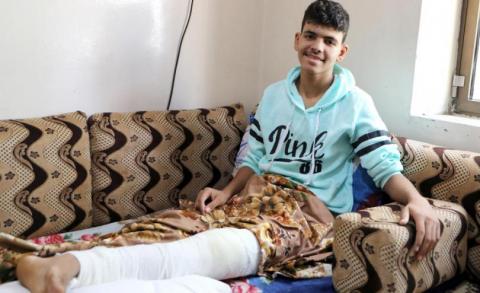Dealing with COVID-19 in Yemen


Action Against Hunger’s Deputy Program Manager in Yemen, Dr. Samar Kanzel, explains the impact the coronavirus pandemic will have on healthcare systems and food security in the war-torn country.
Communities who have already been forced to leave everything behind to keep their families safe are now facing a new, silent threat: the coronavirus. In the midst of ongoing conflict and a collapsed health system, people in Yemen are now confronting COVID-19. As of September 1, there have been more than 1,900 confirmed cases of COVID-19, resulting in 567 deaths.
Below, Dr. Samar Kanzel, our Deputy Program Manager in Yemen, explains how Action Against Hunger is responding to the pandemic.
CORONAVIRUS CONCERNS IN YEMEN
COVID-19 affects all aspects of life in Yemen. Yemenis are already suffering from high rates of malnutrition, and respiratory infections, malaria, dengue fever, and cholera outbreaks are common.
“We have a weakened immune system,” explains Dr. Samar. “The COVID-19 outbreak in the country layers a new emergency on top of an emergency; it puts us at higher risk of illness and lowers the body’s ability to fight diseases.”
People infected with severe cases of COVID-19 face challenges in accessing treatment due to the country’s lack of hospital beds. Those with milder cases can’t afford at-home treatments.
“Many people are not getting treatment simply because they don’t have the financial means, not because they are not familiar with the process or treatment protocol,” says Dr. Samar.
Financial barriers and lack of access to healthcare make an already critical situation worse.
COVID-19 AND THE IMPACT ON FOOD SECURITY IN YEMEN
The pandemic is elevating concerns around a worsening food crisis in Yemen. With many people losing their jobs, families are struggling to provide food, medicine, and other necessities without income.
“Daily-wage workers suddenly became jobless,” notes Dr. Samar. “They are struggling to make ends meet.”
Cost of living in Yemen has significantly increased as a result of the ongoing conflict, which began in 2015. Communities are dealing with inflation, currency depreciation of their currency, and rising prices for food and other essential goods.
“We already had a crisis here well before coronavirus, so you can imagine what the situation is like now,” says Dr Samar. “The already dire situation is likely to deteriorate considerably.”
HOW YEMENI CITIZENS HAVE REACTED TO COVID-19
In Yemen, it’s believed many people became infected and died from the virus before any official announcement from the Ministry of Health.
“We could not expect citizens to be aware or even believe that coronavirus was real,” says Dr. Samar. “Even though doctors issued warnings, people just ignored them until the Ministry officially reported the first COVID-19 victim.”
With air, land, and sea travel to and from the war-torn country suspended, Yemenis felt that an outbreak was unlikely. However, as more cases recorded, people started to realize that Yemen had open land borders with neighboring countries. Trucks were given access, and drivers infected with the virus may have helped it to spread.
Yemen’s already devastated health system is now under enormous strain because of this new pandemic. "As humanitarian workers, we want to help, but our hands are tied,” says Dr Samar.
ACTION AGAINST HUNGER’S RESPONSE IN YEMEN
Despite restrictions of movement in northern and southern Yemen, Action Against Hunger teams continue to provide lifesaving aid and to treat malnourished children. We’ve also provided our teams on the ground with the information they need to protect themselves and the communities they serve from the virus.
“We’ve launched awareness-raising campaigns and trained all healthcare workers and Action Against Hunger staff,” explains Dr. Samar.
By training both our teams and healthcare workers, the messages will spread through their families and friends. Our staff are also spreading the message by travelling to communities, using visual guides, and implementing door-to-door education campaigns.
“Our volunteers visit rural homes and go to remote areas to meet different households,” says Dr. Samar. “They make sure these meetings are held outside in open spaces where they talk about the coronavirus and how to stay safe.”
In addition to awareness-raising campaigns, we’ve also taken steps to reduce the spread of COVID-19 by installing new handwashing stations and improving the water supply in the country. Our teams are also helping struggling families cope by providing cash transfers, allowing them to buy what they need while supporting local markets.

Paris — The French humanitarian organization Acted announced that it has delivered cash assistance to nearly 89,000 people affected by displa…

Sana’a — Fuel and food imports into ports under the control of Yemen’s Houthi movement on the Red Sea have continued to fall for…

ADEN — Yemen Airways, the country’s national carrier, announced it will resume flights between Aden and Abu Dhabi beginning in January…